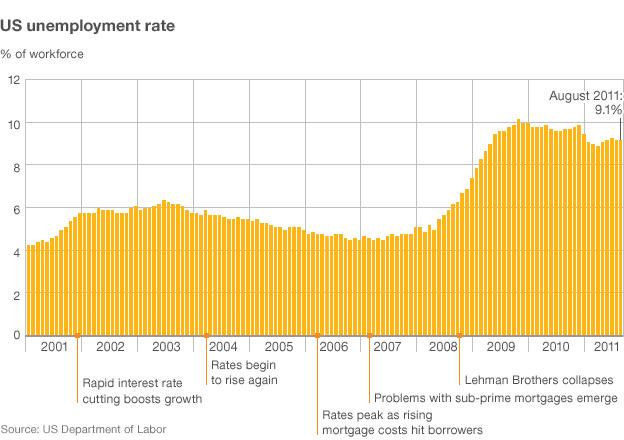Jobs Act: Obama plan eyes taxes on rich
- Published
President Barack Obama says American need jobs now and that it is "no time to play politics"
US President Barack Obama is proposing to pay for his $447bn (£282bn) jobs plan with taxes on the wealthy.
Republicans objected to the proposal, saying the president wanted to bill "job creators".
Mr Obama's payment plan includes limiting tax breaks, removing loopholes for oil and gas firms, and higher taxes for hedge-fund managers.
The American Jobs Act, external, unveiled in an address to Congress on Thursday, must pass a divided Congress to become law.
Mr Obama called on voters to demand that Congress pass the bill quickly.
'Massive tax increase'
The jobs package centres on cutting payroll taxes for workers and employers, and new spending on recruiting teachers and infrastructure projects.
Mr Obama has repeatedly said his plans "will not add a dime to the deficit", and on Monday the White House began laying out the details of how the extra funding will be raised.
White House Budget Director Jacob Lew said President Obama would propose a series of tax increases to fund the bill.
The bulk of the cash - some $400bn - would be raised by limiting the tax deductions and exemptions for individuals earning over $200,000 and families earning over $250,000, Mr Lew said.
Tax loopholes for oil and gas companies would be closed, and there would be changes to the way corporate jets are taxed as well as taxes on the interest earned by fund managers.
Mr Lew said that the president would build a "cushion" of $20bn into the cuts in order to ensure the whole programme was paid for.
Many of those proposals were rejected by Republicans in Congress outright during the summer debate over raising the debt ceiling.
"It would be fair to say this tax increase on job creators is the kind of proposal both parties have opposed in the past," Brendan Buck, a spokesman for House Speaker John Boehner, said on Monday.
House Majority Leader Eric Cantor said: "I sure hope that the president is not suggesting that we pay for his proposals with a massive tax increase at the end of 2012 on job creators."
Before the details emerged, Republican leaders had responded to the jobs proposal in cautiously receptive tones.
Mr Obama's plan will be submitted to the new congressional "super-committee" tasked with cutting $1.2tn in federal spending.
The super-committee will have the option to accept Mr Obama's proposals or offer new ones.
To Boehner's backyard
Speaking in the White House Rose Garden on Monday, the president was joined by teachers, firefighters, veterans and small-business owners, all of whom stand to benefit from the American Jobs Act, he said.
He held a copy of the bill as he urged supporters to lobby Congress for a swift passage.
"If Congress does not act, just about every family in America will pay more taxes next year," Mr Obama said.
Under the current plans, state and local governments would receive $50bn for transport projects, $35bn for school, police and fire department payrolls, $30bn to modernise public schools and community colleges, and $15bn to refurbish vacant and foreclosed homes or businesses.
While Mr Obama has seen his poll ratings fall in recent months, Republican leaders are also aware that Congress' approval rating is currently even lower than the president's.
They have sent the proposal to the non-partisan Congressional Budget Office to be scored.
Mr Obama is due to travel to Mr Boehner's home state of Ohio on Tuesday to promote his jobs plan, after he visited Mr Cantor's electoral heartland of Richmond, Virginia, on Friday.
On Wednesday, Mr Obama will try to rally support for his jobs plan in North Carolina, a traditionally Republican state he won in 2008.
The president's re-election prospects next year could well hinge on his efforts to revive the US economy.

- Published9 September 2011
- Published9 September 2011